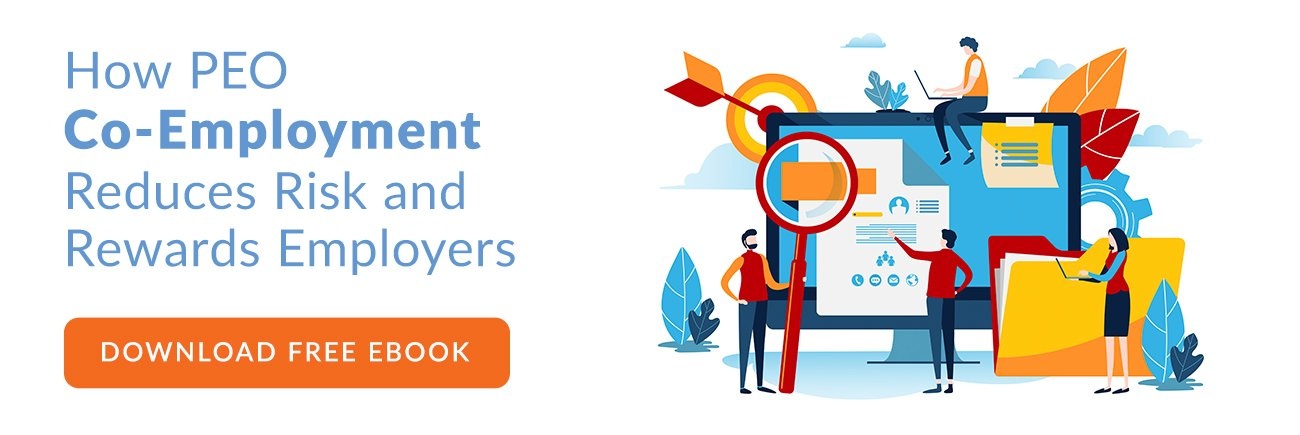As a small-to-medium-sized business, competing against both larger and similarly-sized competitors isn't always easy. Larger organizations have the employees and liquidity to secure more comprehensive benefits and offer superior salaries. At the same time, your smaller, direct competitors are always breathing down your neck to capitalize on the smallest hint of weakness.
Luckily, there's a way for smaller businesses to compete with those larger organizations and give themselves a competitive advantage against their peers. Co-employment relationships give smaller businesses the scale and competitive agility of their larger counterparts, without the need for significant in-house investments and liquidity.
Unfortunately, there's plenty of uncertainty surrounding the term "co-employment." For starters, it's important to understand that co-employment isn't the same as "joint employment.” It's a legal arrangement between Professional Employer Organizations (PEOs) and businesses that gives PEO clients access to the PEO’s healthcare and benefits plans. It also enables PEOs to remit a client business' payroll taxes directly.
What is a PEO?
A Professional Employer Organization (PEO) is an outsourced HR partner equipped to handle your administrative HR duties. From payroll to benefits administration and compliance, PEOs permeate virtually every piece of your HR ecosystem, delivering value streams across your business.
Businesses across the country tap into the power of PEOs to help them scale their administrative capabilities and secure lower rates and better benefits for all of their employees. In fact, research shows that companies with PEOs grow 7 to 9 percent faster than their peers, with 10 to 14 percent lower overall employee turnover. And, in today's hyper-competitive HR ecosystem, finding growth opportunities and cutting costs is more important than ever.
To provide this wealth of benefits, PEOs leverage a critical legal tool called co-employment.
Co-employment: A Simple Definition
Co-employment is a contractual, legal agreement between two organizations that sets forth the responsibilities handled by each organization. Typically, this involves one company taking over administrative duties for another company — allowing business owners to scale and grow without being forced to focus on mundane and repetitive growth-inhibiting administrative duties.
But, and here's where many business owners get confused, there are actually two "types" of co-employment.
Temporary Staffing Agencies vs. PEOs
If you've ever heard about (or read about) co-employment, you've probably read something about "risks" associated with co-employment. But, these risks aren't intrinsic to co-employment laws. They're simply a possibility when you use certain models of co-employment.
In traditional HR settings, most companies will see themselves using one of two co-employment models:
- The PEO model
- The temporary staffing agency model
Temporary Staffing Agency
Under the temporary staffing agency model, there can be risks associated with co-employment. These risks happen when a "joint-employer" status is formed. When temporary staffing agencies supply business workers, the way those businesses treat them can impact their liability.
Professional Employer Organizations
Under the PEO model of co-employment, employers still retain the sole right to hire and fire employees, determine their rates of payment, supervise their working conditions, and maintain their records.
It's best to think of PEOs as knights of administration. They handle the dirty work, but not your employees. Technically, PEOs don't even act as "primary employers" like many staffing agencies. Instead, PEOs are "employers of record," which allows businesses to file payroll taxes under the Employer Identification Number (EIN) of the PEO. It also enables several important benefits.
The Benefits of the PEO Model of Co-employment
Co-employment is an incredibly powerful tool that allows PEOs to give you some incredible benefits, like:
1. Payroll Management
What's the worst part of running a business? According to 40% of business owners, it's bookkeeping and payroll. After all, payroll is time-consuming, and simple mistakes can lead to severe consequences. Half of your employees will begin looking for new jobs after just two payroll errors. And small businesses incur over $7 billion in civil penalties related to issues like payroll errors every year.
With a PEO, you don't have to worry about payroll issues. For starters, PEOs come well-equipped to handle the nuances of payroll administration. They bring best-of-breed technology and highly trained skill to the table. But PEOs also bear partial responsibility for payroll errors such as misclassification, so they have the legal incentive to ensure that every single pay stub is accurate.
2. Economies of Scale Benefits
Co-employment also gives PEOs the ability to add your employees to their benefits plans. Since PEOs work with hundreds of other companies, they can pool the employees from all of those companies and use them to secure best-in-class benefits at enterprise-grade rates.
In other words, you get low rates on fantastic benefits backed by incredible advice and benefits administration experience.
3. Pay-as-You-Go Workers' Compensation Insurance
Almost every business is required to have workers' compensation. Unfortunately, workers' comp rates can be expensive. And, paired with a hefty down payment, workers' comp can create liquidity issues, fast. Through co-employment laws, PEOs can secure A+ workers' comp insurance plans that require no down payment on your end. Plus, you can secure pay-as-you-go plans that operate on a monthly basis.
Of course, insurance rates aren't the only financial struggle associated with workers' comp. The average cost of a single workers' comp claim is over $40,000. PEOs provide critical experience and advice to help you navigate the increasingly complex claims landscape.
PEOs Can Help Your Business
Co-employment is the tip of the iceberg. PEOs provide a nearly endless supply of HR benefits for companies looking to set aside their administrative duties to focus on growth. From background checks and job descriptions to labor law compliance, unemployment claims, and employee handbooks, PEOs remove HR frictions from your growth pipeline.
There's a reason that 98% of PEO clients would recommend one to a friend; they're an incredible tool that can help you cut costs, boost growth, and reduce complexities.



